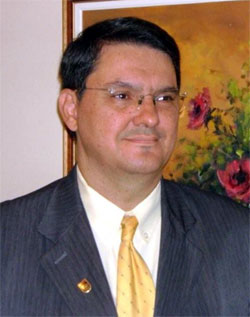|
Hélio Ribeiro
Loureiro:
“The goal we
should all
follow is to
live the
Doctrine and
change ourselves
day
after day”
Our week’s
interviewee
takes about the
effort made by
spiritist in Rio
de Janeiro to
unify the
movement which,
as a result,
brought
beneficial
results to it
 |
Hélio Ribeiro
Loureiro
(picture) is
a spiritist for
27 years. He was
born in Niterói
and now lives in
São Gonçalo (Rio
de Janeiro,
Brazil). He is
linked to
several
institutions and
spiritist
activities.
Hélio here tells
us about the
debates and
efforts made to
unify the
spiritist
movement in Rio
de Janeiro.
O Consolador:
You have lived a
transitional
period for the
movement in Rio
de Janeiro. Can
you please
describe this
unification
process to us?
In our State we
had a problem
with the
political and
management
fusion from the
|
|
state of Rio and
the state of Guanarabara,
which dates back
from 1975.
Guanabara
nowadays is the
city of Rio de
Janeiro, capital
of Rio de
Janeiro State.
There were two
Federative and
both places
couldn’t easily
be merged into
one. |
When we took the
Presidency of
FEERJ in 2000,
we went to the
National
Federative
Council from FEB
(Brazilian
Spiritist
Federation). We
proposed the
idea of
‘combined work’.
This process
lasted for 5
years. Vanity
and pride tried
to get on the
way, but with
God’s help this
change happened.
On the 26th
March 2006, 113
spiritist
centres
associated with
the new
Federative
created. This
meeting was held
by FEB’s
President Nestor
Masotti, at
Avenida Passos,
30, Rio de
Janeiro. The
Name of the
State Federation
is, from that
day onwards,
Conselho
Espírita do
Estado do Rio de
Janeiro – CEERJ
(Spiritist
Council of Rio
de Janeiro
State).
O Consolador: So
basically there
was USEERJ and
FEERJ?
Yes, there were
two Federations,
which
distinctive
roles, in one
single State.
Within Geisel’s
government two
Federations were
created in order
to avoid
opposition to
his government.
I would like to
raise that there
no distinctions
in terms of
Doctrine
itself.
O Consolador:
What are the
remarkable
points within
the history of
FEERJ?
FEERJ has
contributed a
lot in the
disclosure and
practice of
Spiritism.
Courses for the
formation of
Spiritist
Teachers for
Children and
Youth started
around 1970’s.
They had the
participation of
Cecília Rocha,
who is nowadays
the
vice-President
of FEB
(Brazilian
Spiritist
Federation).
There were
memorable
courses which
were held in
different parts
of the State.
At the time,
Floriano Moinho
Péres, who was a
great leader for
the spiritist
cause, was the
President of
FEERJ. His wife
Luzia Péres was
responsible for
the Children and
Youth
department. We
now have a
historical
archive for
classes for
Children and
Youth in our
centre, in
Niterói.
O Consolador:
Has the change
within FEERJ
altered its
study programme
and spiritist
disclosure?
With the
unification,
FEERJ conceded
the Federative
function to
CEERJ. It also
changed its
statute, and its
name became
Instituto
Espírita Bezerra
de Menezes (IEBM).
It kept the same
activities since
its foundation
on 1907: to
study the
Doctrine and
practice it. It
also works
together with
Instituto Dr.
March, which
was founded on
3rd October
1934. Together
with the city of
Niterói, we
maintain a
nursery for 200
children. IEBM
then started to
expand its
activities,
within the study
and disclosure
of Spiritism. We
have 6 public
weekly meetings,
within which
more than 1.000
people come to.
O Consolador: Do
you know how
many
institutions
exist in Rio de
Janeiro, Brazil?
In the State of
Rio de Janeiro
there are 94
cities, from
which only 6 do
not have a
spiritist
centre. There
are 600 centres
associated to
CEERJ (113 came
from the
previous FEERJ).
There are around
300 groups that
are not
associated to
the Federation.
Our friend Luiz
Carlos from
GEUFA
(Institution
from Volta
Redonda) made a
research that
pointed out the
countryside has
more centre than
the capital. The
spiritist
movement is
split in local
councils and the
Unified
Spiritist
Council (CEU).
In each Unified
Spiritist
Council (CEU)
there are seven
associated
institutions.
There are 42
CEU's within the
State. In some
regions or
cities there
could be more
than one CEU.
Volta Redonda,
Niterói,
S.Gonçalo, Duque
de Caxias and
Nova Iguaçu, for
example.
O Consolador:
What would you
like to point
out, in terms of
your experience
and a public
speaker and
coordinator of
publishing
Spiritism?
We have learned
a lot from the
work of
unification.
Institutions
need to be
visited and need
to visit other
spiritist
centres. It is
only through
this exchange
that experiences
will be learned,
and the movement
will become
stronger. We
need to
remember, as
representatives
of our Doctrine
to take the work
of Kardec
forward. He is
still unknown to
a lot of people;
even to people
within our
movement.
O Consolador:
Can you please
give us the site
of the
institution?
Our Federation’s
site is:
www.ceerj.org.br
O Consolador: Do
you think the
exchange between
other States is
good? Can you
please tell us
more about your
relationship
with the
National
Federative
Council?
It’s very
rewarding to
visit other
centres in our
states. The
experience is
very enriching.
I have actively
participated on
the National
Federative
Council meetings
for 6 years. It
is very good to
hear the
experiences of
our colleagues.
Their
difficulties in
disclosing the
Doctrine and new
methodological
ideas for the
study of
Spiritism make
this exchange
extremely
rewarding.
O Consolador:
Can you please
give us your
final words?
What really
worries me today
is the lack of
knowledge
spiritists have
regarding the
Doctrine. It
states we need
to change our
behaviour;
improve our
feelings. We
need to live the
Doctrine every
day and let it
modify
ourselves. This
should be the
goal of everyone
who follows the
spiritist
Doctrine.
|